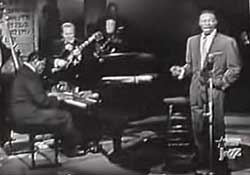 One of the nicer Snader Telescriptions is of Nat "King" Cole was Sweet Lorraine (1951). But there's another filmed version of this number with Nat giving an entirely different interpretation standing at the microphone, in an episode of his television series in 1957.
One of the nicer Snader Telescriptions is of Nat "King" Cole was Sweet Lorraine (1951). But there's another filmed version of this number with Nat giving an entirely different interpretation standing at the microphone, in an episode of his television series in 1957.
By this time the King Cole Trio was no more. Nat's performing the number with Oscar Peterson at the piano, Ray Brown on bass, Herbie Ellis on guitar, & in comes Coleman Hawkins for a sax solo.
This later live performance of "Sweet Lorraine" is included on the two-dvd set The Incomparable Nat "King" Cole more recently reissued on one dvd. This consists of clips from his television show. The full episode runs fifteen minutes with lots of great stuff performed at one of the Norman Granz-emceed nights at the Philharmonic, as Nat's show had a few on-location episodes during its thirteen-month weekly run.
The Incomparable Nat "King" Cole Part I (1991) includes four numbers with the Oscar Peterson Trio plus Coleman Hawkins on sax, of which "Sweet Lorraine" & oh-my-god "Stomping at the Savoy" are the highlight not only of the session but of the entire two-part set of clips.
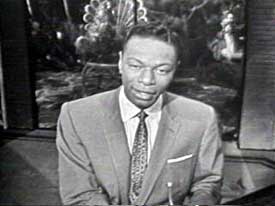 The clips from the regular studio-directed episodes have the Nelson Riddle Orchestra, & Nelson Riddle arrangements. I'm sure Riddle was great for Nat's "new" career as a solo pop singer. But Riddle's whitebread arrangements also have the effect of castrating Nat of his jazz roots. The clips from the regular studio-directed episodes have the Nelson Riddle Orchestra, & Nelson Riddle arrangements. I'm sure Riddle was great for Nat's "new" career as a solo pop singer. But Riddle's whitebread arrangements also have the effect of castrating Nat of his jazz roots.
So when Riddle is jettisoned & Nat sings with Oscar & Coleman et al, suddenly he's inspired, & his greatness as a singer reconfirmed. And such a shame his standard arrangements were no longer those of the Nat "King" Cole Trio instead of Nelson Riddle.
Part I runs fifty minutes & starts off badly with Nelson Riddle arrangements though a few songs are inevitably awfully good even with the generic back-up & arrangements. In the whitebread category are "That Reminds Me," "Little Girl," "I'm Gonna Sit Right Down & Write Myself a Letter," "Ballerina," & not so bad are "I've Grown Accostomed to Her Face" & "It's Only A Paper Moon," though for all these the best that can be said is that it certainly is high-end for television of the era. Great jazz it ain't.
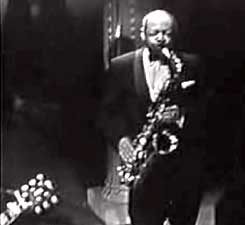 But just as one begins to fear Nat wasn't the genius we remember him having been, we cut to the Philharmonic clips with Oscar Peterson Trio & Coleman Hawkins. The three numbers Nat sings with these guys ("With You On My Mind" is the least but still great), plus the instrumental that puts Nat at jazz piano (on "I Want To Be Happy"), are outstanding moments. I could only wish the entire fifteen minute episode rather than just highlight clips were here. But just as one begins to fear Nat wasn't the genius we remember him having been, we cut to the Philharmonic clips with Oscar Peterson Trio & Coleman Hawkins. The three numbers Nat sings with these guys ("With You On My Mind" is the least but still great), plus the instrumental that puts Nat at jazz piano (on "I Want To Be Happy"), are outstanding moments. I could only wish the entire fifteen minute episode rather than just highlight clips were here.
Then it's back to the studio for more whitebread, but by then the viewer is so on Nat's wavelength that it doesn't seem so bad anymore, & again it has to be judged as "television entertainment of the 1950s" rather than the concert level jazz singer.
So when Nat sings "Raintree County" about being in love with a blue-eyed woman "For the brave who dare/ There's a raintree everywhere," & knowing Nat's civil rights work, this was a daring moment for a black man to sing of love for a white woman on national television. Plus it's just a good song.
And his combo arrangement for "Just You Just Me" just about recaptures the glory days when he sang only with his trio. Plus a decided highlight in the context of "tv entertainment of the time" is Nat & Ella Fitzgerald together.
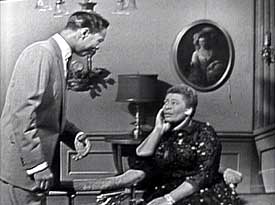 Ella sings "Dancing on the Ceiling" so sweet & well, & Nat does some comedy soft-shoe very charming, which Ella joins for closure. Ella & Nat then sing "To Close for Comfort," again, not that great musically, but primo for tv-entertainment. Ella sings "Dancing on the Ceiling" so sweet & well, & Nat does some comedy soft-shoe very charming, which Ella joins for closure. Ella & Nat then sing "To Close for Comfort," again, not that great musically, but primo for tv-entertainment.
The rest of the numbers one can take or pass over, they're not awful & they're not brilliant. A couple big hits are performed & I find myself not liking these so much, missing too much Nat as a jazz singer instead of a top-forty pop guy.
For instance, Nat sings Mel Torme's "The Christmas Song," which is also circulating as a separate soundie clip. You know the one, "Chestnuts roasting on an open fire/ Jack Frost nipping at your nose." This was a big hit for Nat in 1947 with his trio plus strings, the beginning of his move away from the trio as his central sound. Ten years later he performs it with Nelson Riddle, & it's kind of just lame.
Nat's television show lasted thirteen months & gave him just enough time for him to sing "Christmas Song" on two holiday episodes, including the very last show. If someone demanded I decide whether Mel or Nat sang it better, it's hands-down Mel.
But on the "up" side of his pop hits, at the end of the first fifty minutes of clips Nat sings "Unforgettable" as though to remind us that pop-hits don't have to be schlocky or inferior to Nat's finer jazz days.
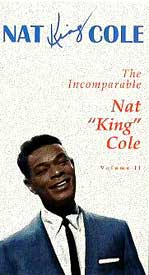 Watching these clips from the television show had a powerful nostalgic hold on me. Nat's TV show was still re-running in syndication for many years after it was cancelled, & somewhere around 1963 (I'm guessing) when I was just a sprite, it became one of my favorite shows.
Watching these clips from the television show had a powerful nostalgic hold on me. Nat's TV show was still re-running in syndication for many years after it was cancelled, & somewhere around 1963 (I'm guessing) when I was just a sprite, it became one of my favorite shows.
In our local television market, Nat's show ran back-to-back with another show that also had mere fifteen minute episodes, starring Rosemary Clooney. These were on every afternoon, & if I rushed home from school, I could just catch them both. They together formed one of my earliest musical obsessions.
Love of these shows put me a bit behind the curve compared to other kids who were embracing rock & role, for I'd go about all day thinking of Nat & Rosemary while kids in my class were into "Puff the Magic Dragon" by Peter Paul & Mary, or "Hey Hey Paula" by the excreble Paul & Paula.
Only when the Beatles arrived did my tastes narrow for a few years, & took a while for me to rediscover jazz, blues, & swing, though the early Rolling Stones were essentially rockifying great blues numbers & I never came totally disconnected from the greater stuff. Yet from about age six to age thirteen I was an eency weency pop-jazz fan which made me just a tad weirder than the average kid of the time.
And those weird tastes went back to the ragtime era. I was the only one in the first grade who knew the words to "Alexander's Ragtime Band" or could sing "Has anybody here seen Kelly? K-E double L-Y. Has anybody here seen Kelly? Have you seen him smile?" I thought it was about Kelly the Clown & the joke was Kelly the Clown never smiled.
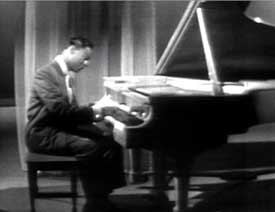 I don't even know how I learned such songs by the time I was seven, perhaps from my great-grampa, perhaps from Fleischer brother cartoons & recycled old musicals that local stations ran in the afternoons in the black & white days of television. I don't even know how I learned such songs by the time I was seven, perhaps from my great-grampa, perhaps from Fleischer brother cartoons & recycled old musicals that local stations ran in the afternoons in the black & white days of television.
But lest you think I must've been musically sophisticated for a child, there was another fifteen-minute show, the same vintage as Nat's & Rosemary's shows, & which I also adored, & it starred Liberace & his violinist brother who was frequently addressed on the show as "Gorgeous George."
I thought George Liberace was a wrestler who I knew about from jibbering enthusiasm from my fire-eating step-father, a carnie who just loved wrestlers, & my little-kid brain was just so enthused that a wrestler was so good on violin.
I think I just loved to see people on TV looking right at me & singing, seemingy, just to me. And I wasn't yet susceptible to peer groups, so I easily soaked up stuff that other kids didn't care about.
When Nat first found himself in the way of the opportunity of being one of the first black entertainers to have his own national television show, it had to have been the earlier Snader telescriptions that helped to prove what a dynamic presence he was for this medium.
Anyway & however, no advertiser was ever found for Nat's show, though NBC kept it going for some months even without advertisers, because they knew the show was too damned good to cancel on the basis of advertisers' fear of the wrath of racists.
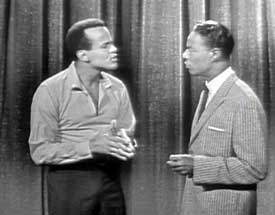 The Incomparable Nat "King" Cole Part II (1992) stars with a very funny bit with Nat at the piano & Sammy Davis, Jr., singing. Sammy is doing a pretty good impersonation of Nat. Then Nat asks if he can join in, & begins impersonating Sammy.
The Incomparable Nat "King" Cole Part II (1992) stars with a very funny bit with Nat at the piano & Sammy Davis, Jr., singing. Sammy is doing a pretty good impersonation of Nat. Then Nat asks if he can join in, & begins impersonating Sammy.
Nat singing like Sammy & Sammy like Nat amuses even themselves, & it's a marvelous little clip. Though once again, it has to be judged as top-grade television entertainment, rather than as the fine jazz Nat was capable of when he had the Trio.
The Nat "King" Cole Show had many such guests during its one year on the air, but in these two selections of moments, we get damned few examples. One of the highlights of Part I had been the entertainment-packed veritable skit-with-song performed with Ella Fitzgerald, & the musical highlight was with the Oscar Peterson Trio & Coleman Hawkins. But for the most, Part I showed Nat on stage by himself, with the mediocrity of Nelson Riddle failing to inspire Nat vocally.
Part II provides only a scant bit more of the "guest star" appearances which livens up the clips a lot. We'll be treated to the Mills Brothers, Johnny Mercer, Harry Belefonte, & again the Oscar Peterson Trio. If Oscar instead of Nelson had been Nat's standard back-up, think how brilliant these thirteen months of episodes could've been!
The roster of guests they had to select from included Count Basie, Pearl Bailey, Eartha Kitt, Mahalia Jackson, Tony Bennett, Mel Torme, Peggy Lee, June Christy, Cab Calloway, The King Sisters, The Hi-Lo's, Billy Preston when he was a cute wee ten years old, actors like Cornell Wilde, Betty Hutton, & Hugh O'Brian, & many others, including several more moments with Ella, besides guests not so well remembered.
The impression given by the two-part selection is barely even a sampler of Nat's guests, & frankly, the cutesie-poo cuteness of Sammy Davis Jr. & Harry Belafante with Nat (singing the child-appeal "Mama Look, A Boo Boo") gives wholly the wrong impression.
But no need to gripe about what was left out when it's bad enough what was selected. "Many a Tear Has To Fall" & "Anything Goes" & other "regular" numbers start things off, each with that recurring sense that Nat would be singing at a higher level if not saddled with the Nelson Riddle Awful Orchestra.
"Anything Goes" is camped up with Nat' pretending to be be driving a car to the Sands in Los Vegas, where he's a headliner in the Copa Room. Nat then sings "Zing Goes the Strings of My Heart" at the Copa Room. He actually did four television episodes from the Copa, of which we get a sampler of five numbers all told, including the faked trip in the car. There's no clue in this sampler that Ella Fitzgerald & Tony Bennett were his guests, grumble grumble.
Back in the studio he does a not-bad rendition of "Smoke Gets In Your Eyes" but over-orchestration continues to be a killer, keeping Nat from achieving excellence. The terrible arrangements make it a blessing most of the numbers never come close to the two-minute mark. "Mona Lisa" was one of Nat's favorites sung four times on the show. Nat on live concerts tended to leave it for his final close. This arrangement though it just awful & a good thing it's so short.
Interestingly, though, "Mona Lisa" is staged with an array of masked white women. And if you're getting up there in years like I am, you'll remember how rare that was in early television, to see black people & white people on the screen simultaneously. It was in fact an unspoken taboo which with NBC's support Nat absolutely refused to adhere to.
Other early shows that had black guest stars would introduce them then cut away to the performer & never be seen standing side by side or doing a duet. And the thing most feared was sexy black guys with hot white babes. Ellecting to put the white babes in masks had to have been a minor inside-joke for everyone!
So yeah, in days when Civil Rights were high in America's politics (one of Nat's Tuesday night shows in first run was even pre-empted for a Civil Rights debate in Congress), & Nat may not have been much of rhetorician on the topic, but his activism was profound. A famous concert in the South, where he agreed to appear only if it was integrated on stage & in the audience, resulted in a racist assault upon his person, which he fortunately survived but vowed never again to return to the south again, which he never did. In a segragated world, Nat literally risked his life for equality.
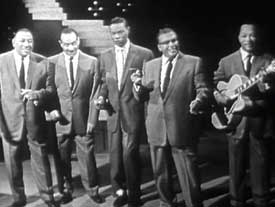 And lets face it, Nat was making many a white woman fantasize trading in her dullard hubby for a fox. And lets face it, Nat was making many a white woman fantasize trading in her dullard hubby for a fox.
Injustice may have been profound & may still be profoundly imbalanced white to black, but that didn't change the fact that this beautiful black man gazing adoringly out of the television set in 1957 into American households was singing to all of America's women when he got all ultra-romantic with that smooth voice & bedroom gaze.
Having hoped eventually to see some of Nat's guests, we finally get one, songwriting singer Johnny Mercer. Nat's at the piano, Johnny's standing, & they sing together "Save the Bones for Henry Jones," the whimsical vegetarian song reminiscent of such great & funny jazz singers as Louis Jordan, & how I wish there were more numbers like it on this disc.
He performs "Tenderly" with the Oscar Peterson Trio, who inspire him to a good performance in spite of Nelson Riddle horning in with unnecessary orchestral noise. Oscar's piano solo is just too cool. Another guest-star moment features the Mills Brothers singing the comical "Opus One," with Nat joining in.
Nat does a nice enough rendition of Victor Young's "When I Fall In Love" & his rendition of "Shadow Waltz" (the show's themesong) is haunting & guaranteed to get all female viewers of 1957 wet.
There are many additional standards sung in a competent manner allowing for the sappy orchestration. Much of it is bland, like "Shine on Harvest Moon," but only one song is seriously butchered, "Blueberry Hill" Though the main reason it's ruined is the honky "bum bum de bum" in the background by the Boataneers, who made want to stuff little boats in my ears.
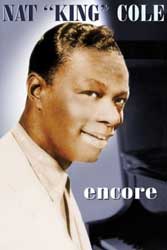 Even though this compilation isn't as impressive as it should have been, I would nevertheless recommend The Incomparable Nat "King" Cole parts 1 & 2 for the widest sampling of material from The Nat "King" Cole Show.
Even though this compilation isn't as impressive as it should have been, I would nevertheless recommend The Incomparable Nat "King" Cole parts 1 & 2 for the widest sampling of material from The Nat "King" Cole Show.
There are other smaller selections that so hugely overlap the two-part compilation as to contain very little in addition. A better selection of material from the shows would certainly be possible, but rights were cleared for this batch & they're apt to be recycled without better choices.
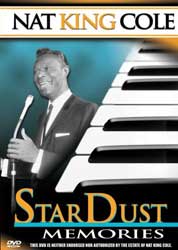 Nat King Cole: Encore (2004) is a compilation of twenty film clips, adding up to a scant forty minutes of material mostly covered on Incomparable. Nat King Cole: Encore (2004) is a compilation of twenty film clips, adding up to a scant forty minutes of material mostly covered on Incomparable.
Nat King Cole: Stardust Memories (2004) is only about a half-hour of material, which just ain't enough & really pushes how little can be foisted onto the public & still part them with their dollars.
It includes a couple of soundies, including Frim Fram Sauce (1945), but most of these clips are from his 1957 television show & once again redundant to The Incomparable Nat "King" Cole, whereas the complete soundies & telescriptions can be had on Nat "King" Cole: Soundies & Telescriptions (2004) without overlapping Incomparable.
I haven't made a complete comparison of each of these so there might be something really worth having not available elsewhere for a completist, but these "discount" dvds with public domain material tend to be pretty haphazard at best.
In the main Encore & Stardust Memories & similar random compilations are mere "also rans" & all you really need is the complete soundies & telescriptions dvd, & the two-part Incomparable.
copyright © by Paghat the Ratgirl
|
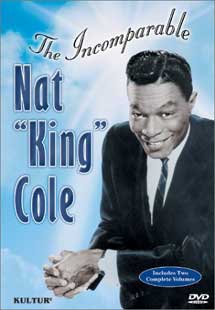

 The clips from the regular studio-directed episodes have the Nelson Riddle Orchestra, & Nelson Riddle arrangements. I'm sure Riddle was great for Nat's "new" career as a solo pop singer. But Riddle's whitebread arrangements also have the effect of castrating Nat of his jazz roots.
The clips from the regular studio-directed episodes have the Nelson Riddle Orchestra, & Nelson Riddle arrangements. I'm sure Riddle was great for Nat's "new" career as a solo pop singer. But Riddle's whitebread arrangements also have the effect of castrating Nat of his jazz roots. But just as one begins to fear Nat wasn't the genius we remember him having been, we cut to the Philharmonic clips with Oscar Peterson Trio & Coleman Hawkins. The three numbers Nat sings with these guys ("With You On My Mind" is the least but still great), plus the instrumental that puts Nat at jazz piano (on "I Want To Be Happy"), are outstanding moments. I could only wish the entire fifteen minute episode rather than just highlight clips were here.
But just as one begins to fear Nat wasn't the genius we remember him having been, we cut to the Philharmonic clips with Oscar Peterson Trio & Coleman Hawkins. The three numbers Nat sings with these guys ("With You On My Mind" is the least but still great), plus the instrumental that puts Nat at jazz piano (on "I Want To Be Happy"), are outstanding moments. I could only wish the entire fifteen minute episode rather than just highlight clips were here. Ella sings "Dancing on the Ceiling" so sweet & well, & Nat does some comedy soft-shoe very charming, which Ella joins for closure. Ella & Nat then sing "To Close for Comfort," again, not that great musically, but primo for tv-entertainment.
Ella sings "Dancing on the Ceiling" so sweet & well, & Nat does some comedy soft-shoe very charming, which Ella joins for closure. Ella & Nat then sing "To Close for Comfort," again, not that great musically, but primo for tv-entertainment.
 I don't even know how I learned such songs by the time I was seven, perhaps from my great-grampa, perhaps from Fleischer brother cartoons & recycled old musicals that local stations ran in the afternoons in the black & white days of television.
I don't even know how I learned such songs by the time I was seven, perhaps from my great-grampa, perhaps from Fleischer brother cartoons & recycled old musicals that local stations ran in the afternoons in the black & white days of television.
 And lets face it, Nat was making many a white woman fantasize trading in her dullard hubby for a fox.
And lets face it, Nat was making many a white woman fantasize trading in her dullard hubby for a fox.
 Nat King Cole: Encore (2004) is a compilation of twenty film clips, adding up to a scant forty minutes of material mostly covered on Incomparable.
Nat King Cole: Encore (2004) is a compilation of twenty film clips, adding up to a scant forty minutes of material mostly covered on Incomparable.